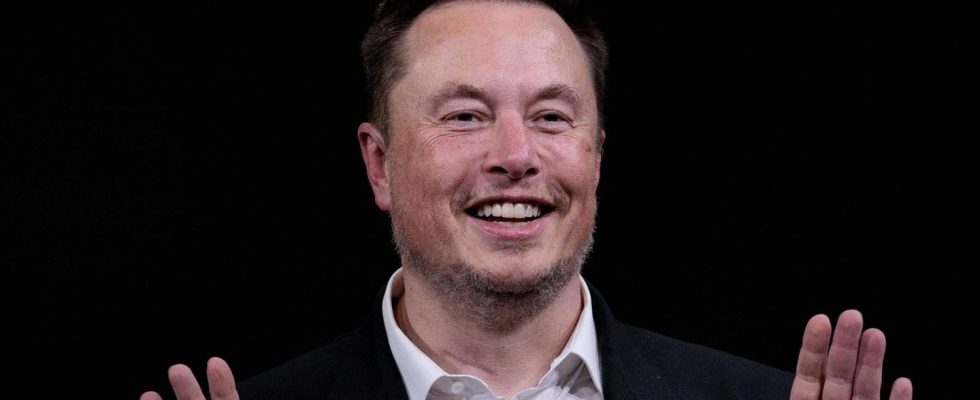Warning from EU
Twitter is overrun with false reports about the war in Israel – and Musk continues to post conspiracy theories
If you believe Elon Musk, Twitter/X has no problem with disinformation
© Joel Saget / AFP
Fast on-site reporting was one of Twitter’s greatest strengths. But when it comes to the Israeli war, the service currently has a real problem. And boss Elon Musk is making it even worse.
The war in Israel dominates the news – including on the short message service X/Twitter. But while the live insights have long been one of the short message service’s strengths, the last few days have revealed weaknesses in dealing with false reports. Owner Elon Musk prefers not to hear that – and responds to it in his own unique way.
The cases have increased so much in the last few days that there is now even a risk of trouble with the EU. Commissioner Thierry Breton had publicly warned Musk in an open letter on Twitter: The platform is responsible for removing disinformation and content that is illegal under EU law, it says. Examples can be found quickly. A report that the Israeli army had destroyed one of the oldest churches in the world circulated unabated for days. “I expect a quick and complete response from you in the next 24 hours,” Breton tried to put pressure on him.
Fast reaction
Musk’s reaction came faster than the deadline – and was expected. According to Musk, his company is transparent. And pretended to be ignorant: “Please list all the violations that you accuse of X so that they are known to the public.” He did not want to accept Breton’s comment that the violations had of course all been reported to X. “We don’t do background deals. Please post all advances on this platform,” he demanded. He then continued to pretend to other users that he had no idea what the allegations were about.
In fact, it shouldn’t be particularly difficult for him to figure out. His own security team documented in a detailed post on Tuesday how they were taking action against the flood of false reports in several ways, including deleting thousands of newly created Hamas accounts and removing videos of extreme acts of violence.
Paypal, Tesla, SpaceX
Elon Musk: His companies, his family – the richest person in the world in pictures
Self-aggravated problem
Twitter is fundamentally not alone in this fight. “Social networks are struggling to get a handle on the constant flood of disinformation and incitement to violence”; complained scientist Andy Carvin to the AFP news agency.
The fact that, according to Carvin, the trend “that has been building up for a long time” is now getting even worse and Twitter is particularly suffering from it, is also directly related to Elon Musk’s decisions. By replacing the verification of accounts with a subscription model that also promises more visibility, it became particularly easy to spread false reports outside of your own network. Because subscribers also receive a share of the advertising revenue if they reach a large number of people, there is even a financial incentive to quickly spread even unverified reports. Even excerpts from video games like “Arma 2” were suddenly distributed as authentic war footage.
What’s more, the aforementioned security team was slashed as part of the mass layoffs to a fraction of the size it was before Musk took over. “This drastically limits their ability to keep up with the chaos,” Carvis believes.
Musk prefers to gossip
The fact that the boss has a different view of the situation can be seen from his feed. He repeatedly shares or comments on extreme opinions, speaks out against the mainstream media or relies on conspiracy theories. In recent days, he called terrorist attacks in the US “just a matter of time” in response to a conversation by Trump adviser Steve Bannon, indirectly referred to Sweden as a no-go area and shared a meme claiming to be about Israel reported more than the war in Ukraine. He also casually supported theories that the media was controlled by the CIA and that the US political left hated Asians.
For Musk, it’s all about one thing: He wants to create a space for absolute freedom of speech on Twitter, he emphasized again and again. As a solution to false reports, he repeatedly refers to the so-called community notes, comments that users can add directly to posts.
Let the community sort it out
But that often doesn’t seem to work. After an employee gave “NBC” access to the system, the news channel was able to find out that even false reports with hundreds of thousands of views did not receive any corrective notes. Of 120 tweets that spread false reports about a supposed press statement from the White House or the church destruction that was confirmed to be a hoax, only eight percent had even received a correction.
Musk had only one thing to contribute to the accusation: He commented on a post by a user who defended the function and claimed that all other social media were censoring the same thing with “That’s exactly how it is.”
But somehow it seems to bother him. “As always: Please stay as close to the truth as possible”; he wrote on Sunday. “Even on topics you don’t like.”
Sources: Elon MuskTwitter, Wired, Rolling Stones, The Guardian, NBC


